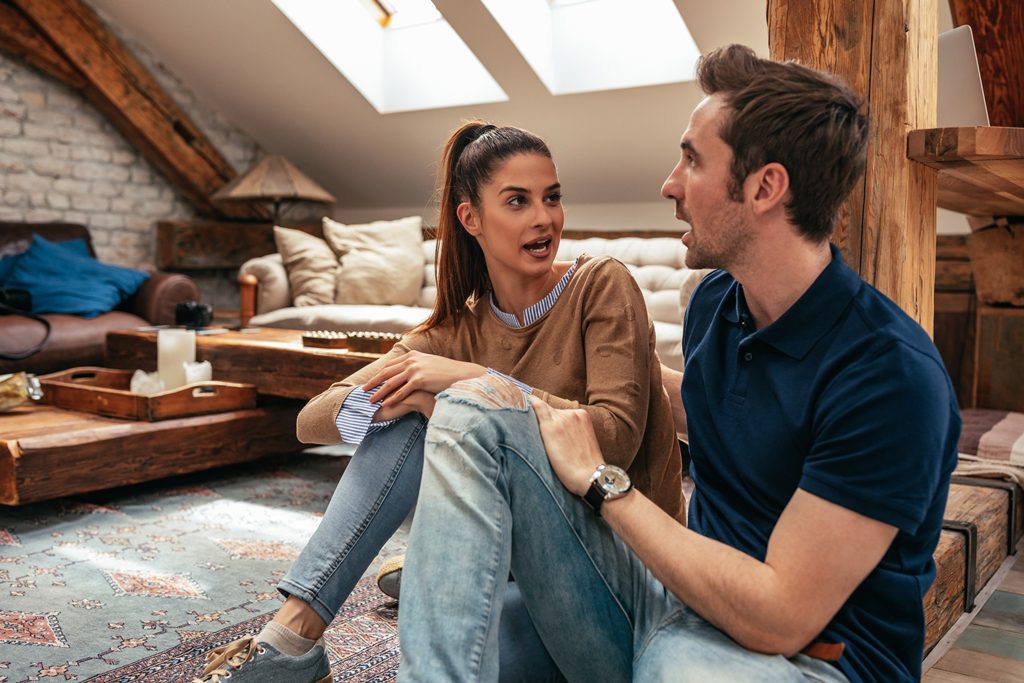
Camaraderie is important to build good relationships in any form, especially in the workplace. By doing this, employee engagement will increase.
Making a good relationship with your family or friends is also important as it leads to a better and stress-free life. Imagine spending your entire life hating someone who used to be your friend or arguing with your loved ones. You cannot focus on yourself or your work when something is bugging you.

But all of these are futile if you have poor listening skills or if you choose to don’t listen at all. Picture this, you put the effort into sharing your thoughts or talking in front of your classmates and then you ask someone but their response is “What?”, how would you feel?
In this article, we will walk you through the reasons why listening is a crucial step in building relationships:
Listening Solves Problems
The number one reason why you have to listen is for you to solve any problem you have with someone or with your partner in particular. When you are clouded with anger, the tendency of not listening to your partner’s explanation is high. Since you did not listen to your partner’s explanation, you will miss the chance to know why he did it in the first place and obviously, this will lead to more quarrels or conflicts.
Listening is a huge part of building and sustaining healthy relationships. It’s the first step to understanding and being understood by others. It’s the key to developing trust and bonding with people. Listening helps create deeper, richer relationships that last for a lifetime. If you want to build good relationships in your life, start by listening to what others have to say!
Without listening, people don’t understand each other. People may also be able to build stronger relationships when they listen to what the other person is saying and not just wait for their turn to talk. Listening helps people see things from the perspective of others and develop empathy for those around them.
Let your partner speak and listen to him intently. By doing this, you will absorb what he is saying and it will make you think or act rationally.

You Show Respect by Listening
You become a teacher for an instance. You walk into your class and you announce something very important but no one is listening to you, you will feel disrespected for sure. Listening to someone talking means you are showing respect to them. But don’t just listen, understand what they are saying so you could make a better response (if only needed, because listening doesn’t always mean you have to respond) that is relevant to what they are saying.
Listening is a crucial part of building relationships and it is done by being attentive to what the other person is saying. You show respect by listening to the person in front of you. It makes you aware that they are an important person, and not just a means to an end.
When you listen to someone, they feel like you are taking their time and giving them your full attention. Listening also helps build relationships because you show respect by listening.
One of the best ways to show respect is by listening. If you are too busy with your own thoughts, you may not be fully present in the conversation and don’t really pay attention. It’s important to remain focused on a person so that even if they say something that flies over your head, you can try to understand what they’re saying.

You Earn Respect by Listening
Listening is a vital skill that often goes unnoticed. You can earn respect by listening to others and it’s one of the most important skills in interacting with people. Next time you are dealing with someone, don’t be afraid to ask questions and really listen to what they have to say. It will not only make you more likable but also increase the amount of trust in your relationship.
Listening builds relationships. People who are good listeners are more likely to be liked, trusted, and respected by others. Listening is also a crucial step in building stronger relationships with your team members and potential customers.
Since you listen to them intently, they will feel respected and in return, they will also respect you. You know, you cannot impose respect, you have to earn that. That’s how it works.
So next time, if you feel the need to talk with someone, make sure that you also listen to that individual when they are venting out the baggage they’ve been carrying so that they will listen to yours too. It’s a life cycle.
The golden rule here is, “Do unto others what you want others to do unto you”.

You Gain Information
This works well especially in a classroom setting or in a workplace. To make a better job or to have good grades in your quizzes, you have to listen to your teacher or your boss. Listening helps you retain information that you can use.
You can also gain information and learn things about the person. You will understand what they are saying by their way of speaking or their tone. What if someone is asking for your help because they are being abused or whatnot, but cannot make a critical move? Signals such as tones or expressions might have an underlying message. You may be able to help them. That’s why when you listen, listen well, you might save a life.
Listening is crucial in building relationships and in many cases, the information you get is more valuable than what you give. For example, if someone was being dishonest with you and you were listening, it would be easy to tell that just by looking at their body language and tone of voice.
You can also get a lot of insight from what people are saying or not saying. Part of the power and influence comes from listening because it shows that your mind is open to hearing what others have to say even if they are uncomfortable talking about certain subjects.

You Build a Safe Zone
Talking to someone might help you create a safe zone, especially if that someone listens to you well with no judgment. You can build a safe zone with someone when you talk about things that should only be in that “zone” with no backstabbing and all. You have to stay loyal and true.
You build trust in a relationship by listening to your partner. You gain their trust first, then you take your turn sharing and listening. By listening, you demonstrate that you are interested in what they have to say, moreover that you care about them. When it comes to relationships, both sides have to work hard for it.
Just like you would never build a bridge without knowing the weight load limit and the type of engineering needed to support it, you also need to conduct some research before building your relationship with others. You may not be able to hear people’s thoughts in order for them to see you as an individual, but if you can understand their emotional state, there is a better chance that both sides will be satisfied by the outcome.
Listening allows us to build trust with those we are close to. As humans, listening activates the same pleasure centers that food does for our brains and makes us want to please others.

You Build Trust
You can build trust by making sure others can depend on you. And if you don’t listen well, you cannot build trust. How can someone trust and depend on you if you don’t listen to them? Even I won’t trust someone who doesn’t pay attention to what I’m saying. Of course, I will choose someone to do the important tasks when they pay attention to what I’m saying, especially if it’s an instruction.
It’s the first step that people usually take when they are trying to build trust, and it can make all the difference between gaining someone’s trust and losing it. Listening builds rapport and understanding which will eventually lead to trust.
It provides you with the opportunity to adjust your message to meet the person’s needs and wants. When someone listens, they trust you more because you are showing them that you are taking their feelings into consideration.

It Establishes Good Relationship
A strong relationship always starts with good conversations. That little hi and hello, and that please and thank you. All of these will turn into something more if attentive listening is involved. To establish a good relationship, take turns in listening. Have a conversation; it’s the key to a more authentic relationship.
Listening is important to building relationships because it helps your partner feel heard, understood, and validated. When you’re in a relationship, it’s also important to listen to what your partner says, whether he or she is talking about their day at work or complaining about the pile of dishes that never gets smaller. Listening creates a space for both people to communicate and understand one another.
Listening means paying attention and trying your best to understand what someone else is saying, feeling, or thinking. Listening can be difficult at times, especially when we’re talking with family members or friends who are going through a hard time or conflict. But doing so will help you build a stronger relationship that lasts for years to come.

Enhances Your Mood
Listening is not just a simple action; it can have an effect on your mood by helping you to feel more positive about the interaction and boosting your confidence. It’s also important because people will open up more easily when they talk, so listening in many ways allows you to hear what they’re really saying.
When you listen to someone, even if you disagree with them, allows them to feel heard and acknowledged. Listening is also an important way to learn about new ideas, thoughts, and ways of thinking. Listening can help your relationships because it will make people feel closer to you.
Listening to your significant other in a positive way can help them feel better about themselves and will show the world that you care about what they have to say. Listening can also help you improve your mood by giving you a sense of control over your life.
Provides Solutions
This can be demonstrated through the following statements: “I felt listened to,” “I felt my needs were being met,” “I felt important.” Listening is connecting with people on a deeper level and understanding their points of view.
Listening can be done in one of three ways: active, passive, or empathetic listening. Active listening involves waiting for the speaker to finish talking and responding with an appropriate response.
Passive listening is where you pay attention, but don’t interfere with the speaker or make any sound or movement while they are speaking.
Empathetic listening is when someone listens without interrupting their thoughts or feelings, their heart rate goes up, and they may get teary-eyed because they are connecting with another person.
Final Thoughts
Listening sets the foundation for successful conversations and interactions. Conversationalists who pay attention to what their partner is saying can build rapport and trust, which is essential to have mutually beneficial relationships.
It enables you to understand the other person and gives them time to explain what they are feeling, without interrupting them. Listening also helps people feel heard, understood, and respected. Developing a relationship takes time and work, but the first step in building these types of relationships is listening. Listening helps you to improve your understanding of why someone has certain thoughts or feelings about something.
When you are listening, you are not trying to think of your rebuttal or thinking about what you can say next and this lets the other person feel heard and understood. While listening, it’s important to stay open-minded and be willing to hear feedback about ourselves.

